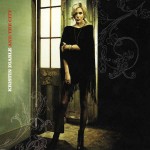The South has been a rich source of capital and small-“M” mythology, and it’s that mythic South that Kristin Diable taps into on Kristin Diable and the City. Filmmakers have presented stylized visions to evoke a strong sense of place, and Diable does a similar thing sonically. She sings with an exaggerated drawl that, like Lucinda Williams’ current vocal style, sounds as much an artistic decision as a function of nature, particularly when paired with Casey McAllister’s electric guitar, which has exactly the right amount of distortion and reverb. Together, they twang in almost archetypal ways.
Needless to say, the album’s long on atmosphere, which was aided by recording the album in an apartment in the Upper Pontalba Building on Jackson Square. When it missteps, it does so by feeling the mood a little too much. “God’s Chambers” is a strong start that taps into the premise of the South as a place where people have a clear-eyed view of the Battle between Good and Evil, but at almost five minutes, it outlasts the insight that “someone’s hiding up in God’s Chambers / trading righteousness out for coins / they’re stealing up the silver lining / leaving us nothing but the clouds.”
Diable’s got a strong sense of how to be evocative. “I’ll Be Leaving” quotes classic country music in its intro guitar lick and its sing-along chorus, but she adapts those features to her sound so the album never feels like a checklist of Southern clichés, even when it flirts with them—an inevitable byproduct of dealing with myths. “True and Natural Man” sounds like the love song every semi-soulful Southern female singer has written (just with other words and in a different key), and it still sounds spot-on.
The danger of trading in the mythic is having your art get lost in it, which happens a bit. The endless twang that sounds perfect at first seems awfully familiar as the album drifts on, and songs written in genre risk sounding generic. The slow, almost underwritten songs make fresh claims for attention as they break form a bit and make the songs more about Diable the writer/storyteller. When she stays with one chord or a funereal tempo, she steps out of the evocative trappings and moves into clearer focus.
Diable’s in the process of staking out her artistic space, and Kristin Diable and the City is a strong step in that direction. Next time, I want to know more about her art because she’s made her context very clear.





